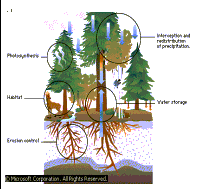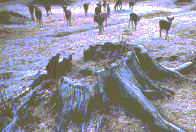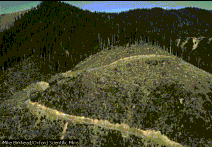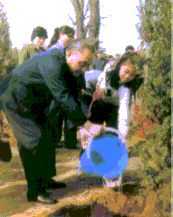 Importance
of Trees Importance
of Trees
Perhaps the most important ecological function
of trees is protecting the land against erosion,
the wearing away of topsoil due to wind and
water. The trunks and branches of trees provide
protection from the wind, and tree roots help
hold soil in times of heavy rain. In addition,
trees and forests store water. In many areas the
removal of forests has resulted in costly floods
and subsequent droughts. Trees and forests also
provide habitat, protection, and food for many
plants and animals. In addition, they play an
important role in global climate and atmosphere
regulation---the leaves of trees absorb carbon
dioxide in the air and produce oxygen that is
necessary for life.
 Trees
have many economic uses. Lumber from trees is
the most widely used material in the building of
homes and other structures. Many trees provide
fruits and nuts such as oranges, grapefruits,
apples, peaches, pecans, hickory nuts, and
almonds. Trees and their fruits are also the
source of many commercial waxes and oils,
including olive oil and coconut oil. Trees
have many economic uses. Lumber from trees is
the most widely used material in the building of
homes and other structures. Many trees provide
fruits and nuts such as oranges, grapefruits,
apples, peaches, pecans, hickory nuts, and
almonds. Trees and their fruits are also the
source of many commercial waxes and oils,
including olive oil and coconut oil.
Chemical materials produced by trees are
used in tanning leather and in the manufacture
of inks, medicines, dyes, and wood alcohol. In
addition, trees are used in landscaping homes,
parks, and highways. In regions with extreme
climates, they serve as windbreaks or as shade
against the sun.
 Forest
Conservation Forest
Conservation
Forests provide many social, economic, and
environmental benefits. In addition to timber
and paper products, forests provide wildlife
habitat and recreational opportunities, prevent
soil erosion and flooding, help provide clean
air and water, and contain tremendous
bio-diversity. Forests are also an important
defense against global climate change. Through
the process of photosynthesis, forests produce
life-giving oxygen and consume huge amounts of
carbon dioxide, the atmospheric chemical most
responsible for global warming. By decreasing
the amount of carbon dioxide in the atmosphere,
forests may reduce the effects of global
warming.
 However,
huge areas of the richest forests in the world
have been cleared for wood fuel, timber
products, agriculture, and livestock. These
forests are rapidly disappearing. The tropical
rainforests of the Brazilian Amazon River basin
were cut down at an estimated rate of 50,000 sq
km (20,000 sq mi) per year in the late 1980s. However,
huge areas of the richest forests in the world
have been cleared for wood fuel, timber
products, agriculture, and livestock. These
forests are rapidly disappearing. The tropical
rainforests of the Brazilian Amazon River basin
were cut down at an estimated rate of 50,000 sq
km (20,000 sq mi) per year in the late 1980s.
 In
the United States and Canada, forests are
threatened by extensive logging, called
clear-cutting, which destroys plant and animal
habitat and leaves the landscape bare and
unproductive if it's not properly reforested.
Small pockets of ancient forests from 200 to
1200 years old still exist but are threatened by
logging interests. Until the 1990s, the U.S.
Forest Service was directed by Congress to
maximize the harvest of timber in order to
provide jobs. In the late 1980s and early 1990s,
however, environmentalists sued the government
for violating the National Environmental Policy
Act (NEPA), and heavy logging was deemed
nonsustainable. As a result, the timber harvest
was reduced and foresters were directed to
follow a more sustainable policy called
ecosystem management. This policy required
foresters to focus on conserving natural
habitats rather than maximizing tree harvest.
Despite this change, many ancient forests remain
unprotected. In
the United States and Canada, forests are
threatened by extensive logging, called
clear-cutting, which destroys plant and animal
habitat and leaves the landscape bare and
unproductive if it's not properly reforested.
Small pockets of ancient forests from 200 to
1200 years old still exist but are threatened by
logging interests. Until the 1990s, the U.S.
Forest Service was directed by Congress to
maximize the harvest of timber in order to
provide jobs. In the late 1980s and early 1990s,
however, environmentalists sued the government
for violating the National Environmental Policy
Act (NEPA), and heavy logging was deemed
nonsustainable. As a result, the timber harvest
was reduced and foresters were directed to
follow a more sustainable policy called
ecosystem management. This policy required
foresters to focus on conserving natural
habitats rather than maximizing tree harvest.
Despite this change, many ancient forests remain
unprotected.
|